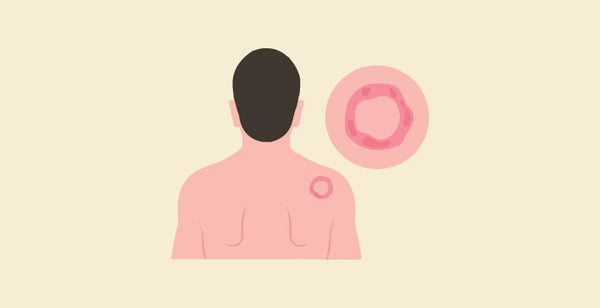Difference Between Psoriasis and Ringworm: Both psoriasis and ringworm are skin conditions affecting the appearance of the skin, but they differ in their origin, appearance and treatments. Psoriasis is a chronic autoimmune disorder characterised by the fast growth of skin cells on the skin, resulting in red, itchy, and scaly areas whereas Ringworm, which is also known as dermatophytosis, is a fungal infection of the skin characterised by a red, circular rash with raised edges.
Psoriasis:
- Autoimmune factors play a crucial role, causing an overactive immune response that leads to skin cell overgrowth.
- It appears like plaques of thick, shiny scales on the skin which are common
- It is linked with other conditions like psoriatic arthritis.
Ringworm:
- Ringworm is caused by various types of fungi such as Trichophyton or Microsporum.
- It looks like circular or ring-shaped rashes with red, scaly, and sometimes blistered edges.
- Ringworm is infectious and may be transferred by coming into touch with infected people or surfaces.
Difference Between Psoriasis and Ringworm:
Psoriasis and Ringworm are both severe skin issues, but are unique in their own aspects. Let's unpack the difference between Psoriasis and Ringworm:
|
Aspect |
Psoriasis |
Ringworm |
|
Definition |
Chronic autoimmune condition with rapid skin cell buildup. |
Fungal infection (dermatophytosis) causing circular rashes. |
|
Cause |
Autoimmune factors leading to overactive immune response. |
Various fungi, such as Trichophyton or Microsporum. |
|
Appearance |
Plaques of thick, silvery scales on the skin. |
Circular or ring-shaped rashes with red, scaly edges. |
|
Location |
Affects various body parts, including elbows, knees, scalp. |
Common on body, scalp, feet (athlete's foot), and groin. |
|
Itching |
Intense itching is a common symptom. |
Itching and discomfort are common symptoms. |
|
Triggers |
Stress, infections, certain medications. |
Highly contagious; direct or indirect contact. |
|
Chronicity |
Chronic condition with periods of exacerbation and remission. |
Recurrent if not effectively treated. |
|
Treatment |
Topical creams, phototherapy, systemic medications. |
Antifungal medications (topical and oral) for treatment. |
|
Association |
Associated with conditions like psoriatic arthritis. |
Not associated with systemic health issues. |
|
Contagious |
Not contagious; does not spread through physical contact. |
Highly contagious; can spread through contact. |
What is Psoriasis?
Psoriasis causes red and scaly spots on the skin, which are typically provoked by stress, environmental changes, or infections. Its constant growth of skin cells causes thick, flaky plaques to form, most typically on the elbows, knees, scalp, and lower back. While it is not communicable, it can flare up unexpectedly, affecting both physical and mental comfort.
Key features of Psoriasis:
- Autoimmune nature: characterised by an excessive immune response directed at skin cells.
- Silvery Scales: This condition is distinguished by the appearance of thick, silvery scales on the skin.
- Psoriatic Arthritis: A kind of arthritis that, in certain circumstances, affects the joints.
- Genetic Predisposition: A family history of psoriasis may raise the likelihood of acquiring it.
- Inverse Psoriasis: A kind of psoriasis that affects skin folds such as the armpits and groyne.
- Biologics: Biologic drugs that target particular immune pathways are advanced therapy alternatives.
- Influence on Quality of Life: Psoriasis can have a major influence on a person's quality of life.
Causes of Psoriasis:
- Psoriasis is caused by an excessive immune response that wrongly targets healthy skin cells, causing them to develop rapidly and accumulate on the skin's surface.
- Individuals with a family history of psoriasis are more likely to acquire the disorder, implying a genetic component in its genesis.
- Environmental Triggers: Stress, illnesses, and certain drugs can all trigger or worsen psoriasis symptoms, impacting the frequency and severity of flare-ups.
- The Koebner reaction is a condition in which new psoriatic lesions grow at locations of skin damage or trauma.
- High levels of stress and certain illnesses can contribute to the start or aggravation of psoriasis symptoms, underscoring the need for both physical and mental health.
Symptoms of Psoriasis:
- Psoriasis develops as red, elevated, and inflammatory areas of skin, frequently coated in silvery-white scales, giving it a characteristic look.
- Silvery-White Scales: The diseased skin surface develops thick, silvery-white scales as a result of excessive skin cell proliferation and accumulation.
- Itching, Burning, or Soreness: Psoriasis is frequently accompanied with itching, burning, or soreness in the afflicted regions, which adds to the pain.
- Dry, Cracked Skin: Psoriasis can cause dry, cracked skin, which can lead to bleeding and discomfort in extreme cases.
- Psoriasis can damage the nails, producing changes such as thickening or pitting, which can impair their look and texture.
While psoriasis, with its unexpected flare-ups and stubborn patches, can be tough to live with, it's important to remember that illness does not define who you are. If you have proactive management, effective treatments, and a supportive network, you may reclaim control and negotiate life with confidence. Remember that underneath the scales is an enduring drive wanting to live a happy and full life.
What is Ringworm?
Ringworm is a fungus that infects the skin, hair, and nails. It is named from the circular, ring-shaped rash that it frequently creates, albeit the ring is not always full. Ringworm is very infectious and can be passed from person to person, through contaminated things, or through contact with sick animals. Topical antifungal medicines are commonly used in treatment.
Key Features of Ringworm:
- Ring-Shaped Rash: Rashes that are circular or ring-shaped and have elevated edges.
- Tinea infections: Different names based on the afflicted location, including tinea corporis (body), tinea capitis (scalp), and tinea pedis (feet).
- Highly contagious: Spreads easily through direct or indirect contact.
- Environmental Treatment: To avoid spread, treatment may include environmental cleanliness.
- Treatments: Antifungal creams, ointments, and oral drugs are commonly used to treat fungal infections.
- Pets as Carriers: Animals, particularly cats and dogs, may transport fungal spores and help spread them.
- Rapid Onset: After being exposed to the fungus, symptoms may appear quickly.
Causes of Ringworm:
- Fungal Infection (Dermatophytes): Ringworm is caused by dermatophytes, which are fungi that live on the skin's outer layer and include Trichophyton and Microsporum.
- Infection spreads by direct or indirect contact with an infected person, animal, or contaminated surfaces such as towels, clothing, or floors.
- Contaminated Surfaces and Objects: Fungal spores can remain on surfaces and objects, leading to ringworm transmission, particularly in warm and humid conditions.
- Warm and humid surroundings: Ringworm thrives in warm and humid situations, producing ideal circumstances for fungal development on the skin.
- Individuals with compromised immune systems, such as those suffering from certain medical illnesses or using immunosuppressive medicines, are more vulnerable to ringworm infections.
Symptoms Of Ringworm:
- Ringworm usually appears as a red, circular rash with elevated margins, producing a unique ring-shaped look.
- Itching and Discomfort: Itching and discomfort are frequent ringworm symptoms, adding to the overall unpleasant experience for the infected individual.
- Ringworm lesions may blister or leak in extreme cases, suggesting a more advanced or extensive infection.
- Hair Loss (Scalp Involvement): When ringworm affects the scalp (tinea capitis), it can cause hair loss in the afflicted regions, adding to the patient's anxieties.
- Scaling, Cracking, or Peeling: Ringworm-affected skin may display scaling, cracking, or peeling, which adds to the typical look and pain.
Similarities between Psoriasis and Ringworm:
Psoriasis and Ringworm might be two opposite poles, but they have some similarities:
- Both Psoriasis and Ringworm are skin conditions affecting the appearance of skin.
- In both illnesses, itching is a common symptom.
- Both disorders can produce changes in the look of the skin, such as redness and scaling.
- Although the specific drugs differ, topical therapies are frequently utilised for both illnesses.
- While psoriasis is a chronic autoimmune disorder, ringworm can recur if not treated properly.
- Environmental variables can impact or provoke both disorders.
- Inflammation is a factor in both psoriasis (autoimmune disease) and ringworm (fungal infection).
- Both of these illnesses are rather frequent skin ailments.
- symptoms and physical changes, both illnesses can have an influence on a person's quality of life.
Psoriasis and Ringworm may be on the same path, but those two medical conditions have unique key features.Psoriasis is a chronic autoimmune disorder characterised by the fast growth of skin cells on the skin, resulting in red, itchy, and scaly areas whereas Ringworm, which is also known as dermatophytosis, is a fungal infection of the skin characterised by a red, circular rash with raised edges.
| Check out More Articles | |
| Difference Between Thick and Thin Skin Anatomy | |
| Difference Between Enzyme and Coenzyme | |
| Difference Between Infection and Infestation | |















